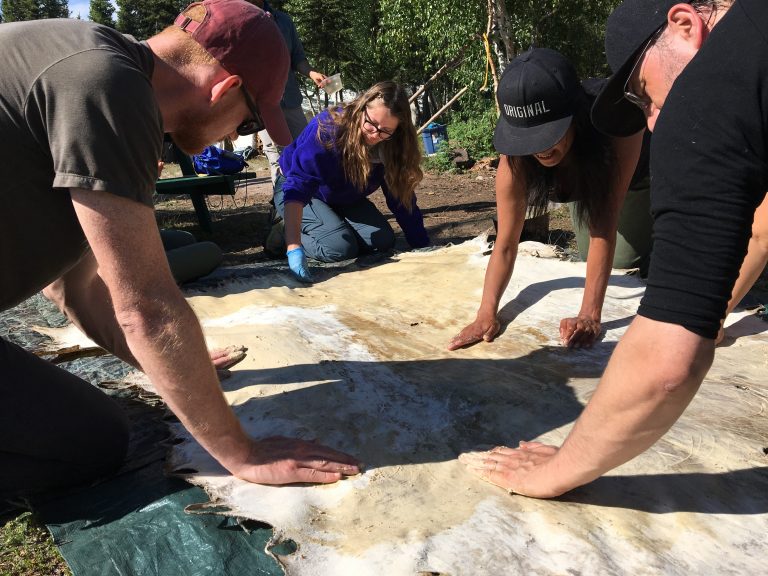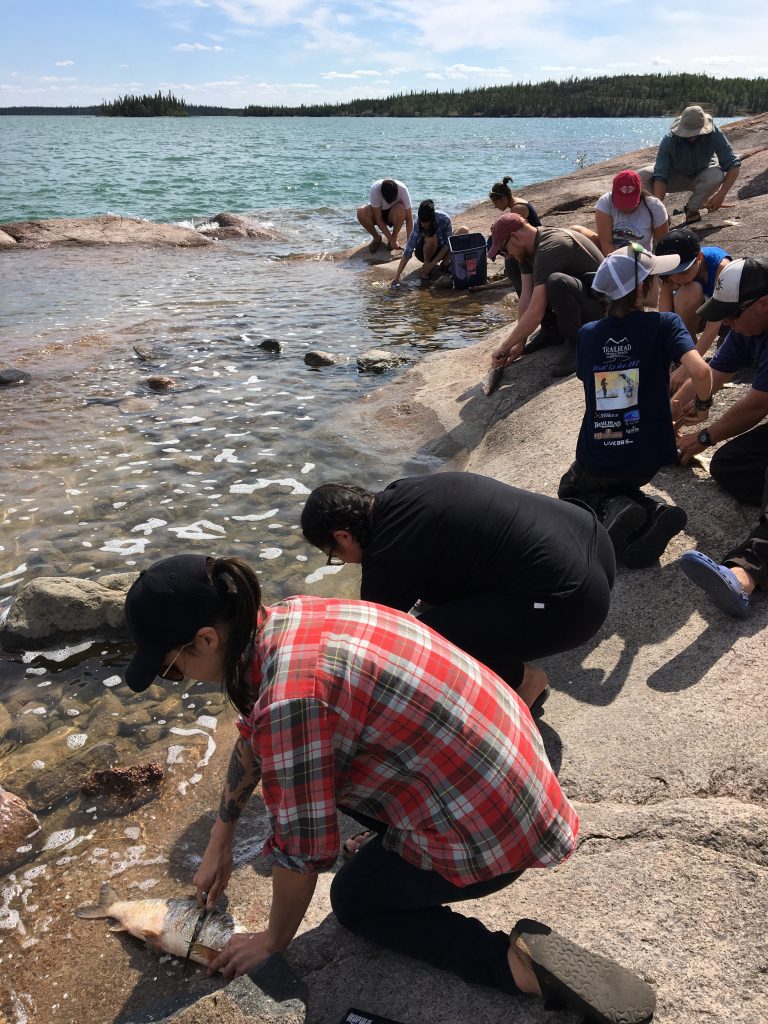

Students following the instruction of Melaw Nakehk’o, spreading fish liver paste on the moose hide to cure it. From left to right: Tyler Hagan, Danika Hammond, Melaw Nakehk’o and Pierre Belanger.
Indigenous land-based learning
On June 26, 2017, five UBC First Nations and Indigenous Studies (FNIS) students travelled to Blachford Lake on the traditional territories of the Yellowknives Dene First Nation to attend the first short course of the FNIS/ Dechinta Centre for Research and Learning partnership in Indigenous land-based learning. FNIS students joined a cohort of students from locations all over Turtle Island, including attendees from Harvard, the Bay Area in California, and Anishinaabe territory in Toronto, Ontario. Faculty included UBC First Nations and Indigenous Studies professor Glen Coulthard (Yellowknives Dene), academic and artist Leanne Betasamosake Simpson (Nishnaabeg), Yellowknives Dene land-user and expert Gordie Liske, Yellowknives Dene Elder instructor Berna Martin, actress, artist and moose hide tanner Melaw Nakehk’o (Dehcho and Denesuline), and Dechinta instructor Siku Allooloo (Inuit/Taino).
Students were lead in instruction that included the history of Denendeh and the struggles of Dene peoples for self-determination, Indigenous political practices, resistance and resurgence, gender, moose hide tanning, Dene medicines and fish harvesting as a practice of decolonization, as well as many other issues central to the wellbeing and empowerment of Dene individuals and communities. Dechinta is an Indigenous initiative delivering accredited post-secondary educational and research experiences on the land.
Led by northern experts, Dechinta aims to engage students and researchers in a transformative curricula and research program based on the unique needs of the north. Dechinta programming centres Dene knowledge, expertise and land-based practices to bring Indigenous and non-Indigenous professors, literature and discussion to the learning community using the best practices of critical Indigenous place-based pedagogies and research methodologies. Dechinta’s approach to research and learning is informed by two fundamental insights: that humans and other-than-human beings are embedded in complex relationships of reciprocal support and care; and that Indigenous land-based knowledge and practices are essential to understanding the nature of these relationships and what is required to sustain them over time.
The mission of FNIS’s partnership with Dechinta is to support a new generation of students, researchers and community leaders by providing accessible and practical learning experiences centred in Dene knowledge systems and local northern contexts, enhanced through the very best of FNIS’s commitment to Indigenous community-based research and curriculum.
-Glen Coulthard
“Participating in the UBC Dechinta global seminar has been one of the best decisions I have made during my undergraduate degree. As a student who extensively studied postcolonial literature through my English major and Indigenous struggles for self-determination and sovereignty over their respective territories through my GRSJ minor, it became alarmingly apparent that in order to better understand a concept like decolonization, I would have to leave the confines of the classroom and learn from the land and those who have dedicated their lives to protecting it. An experience like Dechinta is nothing short of incredible, and I would recommend it to any student studying within the FNIS program.” Prabhi Deol, Dechinta Student
“Land-based practices are freeing, transformative, and vital to decolonial efforts. Dechinta gives us the opportunity to ground our studies in important acts of relationship building, community, and political and cultural resurgence, while allowing us to gain a deeper understanding of the ongoing effects of violent settler colonialism. It is one thing to study decolonial, political, and feminist theories in the comfort of academic institutions; it is another, more powerful thing to experience the way the theories and issues we study both stem from and ground themselves in land-based practices, relationships and experiences.” Alexa McPhee, Dechinta Student


Students and kids on the shore de-scaling fish before preparing them to be smoked.


